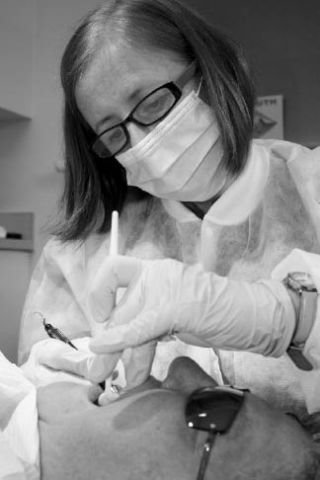As a dental hygienist, Kate Mills has spent 37 years hunched over people’s mouths.
Yuck, you say? You’d think she’d be sick of cleaning teeth and searching for signs of periodontitis by now, but she has a new view of dentistry since co-founding Washington State Smile Partners, a nonprofit that offers preventive services to children and adults who can’t afford a trip to the traditional dentist’s office.
Smile Partners is similar to most businesses in that it seeks growth, additional revenue and stability. The nonprofit’s emphasis, however, is to fill a need that some describe as epidemic among children, working adults and seniors who are uninsured or whose incomes are insufficient to pay for a basic oral evaluation and cleaning.
Before creating Smile Partners three years ago, Mills, who grew up and lives on Bainbridge Island, had grown disillusioned with an emphasis on business that she believes is embraced by most dentists.
Mills and fellow hygienist Nan Bucklin-Hawkes started the nonprofit after identifying a growing need for low-cost preventive dental care among children in several public elementary schools in Kitsap and King counties.
The change has transformed Mills.
“I’m making half of what I made as a regular hygienist, but now I love to go to work,” she said while sitting in her tiny office in the Marge Williams building. “There is such a desperate need now for preventative dental care. So many adults and seniors are falling between the cracks because of the high cost of just keeping your mouth and teeth healthy. It’s overwhelming. It’s in crisis mode.
“So, yes, my job can be fulfilling because so many people have given up on having their teeth cared for.”
According to the medical director of Harrison Hospital’s Emergency Department, Mills said, some 1,300 people came to the hospital last year for “emergency” dental care. Most of the patients were low-income people in severe pain from dental problems and had no place else to go because dentists would not see them.
The problem is national and statewide, and the United Way recently identified access to affordable dental care as Kitsap County’s No. 1 need.
Mills had long recognized a crises among seniors, but it wasn’t legal for dental hygienists to open independent clinics for the elderly until after the state passed HB 1298 in 2007.
In response, Mills created a “Smiles for Life” clinic earlier this year at the Bainbridge Island Senior Center, which donated space for her practice.
Using a sliding fee scale based on the patient’s income (no one is turned away), Mills offers cleanings, screenings, fluoride applications and gum therapy from 8 a.m. to 5 p.m. each Monday. If restorative work is needed, she makes referrals through working agreements with local dentists.
“Bainbridge has the reputation of being rich, but most of the people I see at the Senior Center are poor – living under the poverty level,” she said. “I also get a lot of low-income and emergency cases from Helpline House.
“Most of the seniors had insurance during their working lives, but now they can’t afford it. Medicare doesn’t have dental insurance and most dentists won’t take on Medicaid patients.”
Officially, she is “supervised” by a dentist, but in reality her only contact with dentists is when she refers patients to the ones who have agreed to be involved with her programs, which also include preventative care for children of low-income families, several public schools, pregnant women and veterans.
She said there are some dentists who recognize the need to reach out to low-income people, such as the nonprofit, Service With a Smile, but only a small fraction of the county’s dentists are involved.
‘It’s business first for most dentists,” she said, “Though there are a few who will help us.”
Unfortunately, with the bottom line as important as it’s ever been, she said, those who are willing to take on low-income patients limit their involvement because the need is so pronounced.
“I don’t remember there ever being this level of apathy and number of people not being served,” Mills said. “I’m not sure why. Maybe it’s just that there isn’t as much emphasis on community health these days.
“We (nonprofit hygienists) just try to be as collaborative as we can without banging heads. We can’t diagnose, but we can advocate for our patients. We are just trying to make a difference on the preventative side.”
Mills and the nonprofit’s board of directors, led by President Michael Sellers, a school principal in Bremerton, are hoping to slowly expand the service in Washington. The effort going forward will increase their fund-raising efforts and get more hygienists involved.
“We have two volunteers helping me now,” she said, “and we are talking to hygienists now that are working in private practices to come work with us. They know the need is out there.”
No doubt. The baby boomers, she said, have a mouthful of bad teeth.



